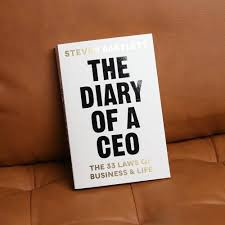
WE often think of tailored Armani suits, and neatly contained C-suite offices when we hear the title chief executive officer (CEO). Meaning to say, the thought of the term CEO tends to be tied to a job title.
However, according to Steven Bartlett, being a CEO hinges on understanding the psychology that drives human behaviour, mastering oneself, and developing the ability to cultivate and effectively lead a team.
It involves applying the principles of psychology and behavioural science to manage both business and personal relationships successfully.
Naturally, we tend to demarcate between business, and life, perhaps proposing the "work-life" balance mantra.
With this distinction in mind, how we approach business, and our personal affairs is vastly different. However, it is important to note that business, is a part of life, and therefore, must be approached through a similar lens. When reading the book, it becomes clear to the reader its transferable nature, because regardless of the industry, trade, or discipline, human psychology governs our actions, and reactions.
Having this knowledge will give the reader a leg up in negotiation, conflict resolution, and self-discipline.
For instance, Law #1 titled Fill Your Five Buckets in the Right Order, Bartlett describes it this way, “…all of the people I’ve met that possess the power to build truly great things have five brimming buckets”.
These are what you know, what you can do, who you know, what you have, and what the world thinks of you. With this law, Bartlett describes the value of human potential, and the assets that are necessary to propel that potential forward.
- Re-imagining the workplace: Google and other company visions
- New arts festival set for Nyanga
- Re-imagining the workplace: Google and other company visions
- Covid-19 centre turned into a maternity ward
Keep Reading
By using examples of successful pioneers in business, it becomes clear that developing great businesses, or great potential is tied to both developing yourself (through your knowledge, skills, and resources) and nurturing relationships (through your network, and your reputation).
Gradually, Bartlett begins to add more insight regarding the invisible influence of human psychology in our daily interactions, and business transactions.
That is perhaps the most profound nugget from the book; the reality of the subtle influence of behavioural science, and psychology in our choices from what we think, to who we buy from, and who we listen to.
Having this knowledge is crucial in managing yourself, while also creating a competitive edge with your business.
In Law #13, aptly titled Shoot Your Psychological Moonshots First, Bartlett tears the veil off the eyes of customers, by revealing the subtle psychological tricks used by brands to create greater (perceived) value of their product.
Once these tricks become obvious, it arms the reader with greater media literacy, more perceptive observation of how their minds work, and how corporates use these tricks for greater sales.
While a number of the laws do apply to business and marketing, there are plenty others that reference the self. Additionally, Bartlett shares insights that he’s gathered from experts to further cement these principles.
In Law #4 for instance, You Do Not Get To Choose What You Believe, he reveals how beliefs are built, “…the things you believe are fundamentally based on some form of primary evidence…” whether or not that evidence is accurate is irrelevant.
Beliefs tend to be difficult to shake off when the brain has accumulated a pool of evidence to back them up. The solution to this, according to Tali Sharot, the professor of cognitive neuroscience at University College London and MIT, is to “work with the brain and how it functions, not fighting against it”.
This means, gathering new, better evidence for yourself to challenge the old belief, rather than breaking the old belief altogether. Apart from hard work, and focus, beliefs are the single most powerful ndicators of success.
And having a scientific understanding of how beliefs are formed, and can be changed is helpful in propelling one’s life forward. They often say art imitates life, I think in many respects, business imitates life also. In The Diary of a CEO, Steven Bartlett offers more than just a guide for success in the corporate world — he holds up mirror to human nature itself. Each law he lays out for navigating business is rooted in behaviours, motivations, and challenges that define our personal lives as well.
Business, after all, does not operate in isolation. It thrives on relationships, communication, and the nuanced dynamics of trust, ambition, and resilience.
For business professionals, this book is a reminder that the strategies we apply in the boardroom can — and should — stem from an understanding of human behaviour.
Bartlett’s insights push us to recognise that just as businesses are built on relationships, so too are our personal lives. Managing your life with the same strategic intentionality you would apply to a thriving enterprise is not just advisable — it is transformative.
As you reflect on your own journey, professionally and personally, let this book be a guide to understanding that the core principles of leadership, growth, and adaptability are universal. Business imitates life because, at its heart, business is life — messy,complex, and deeply human.
Chambani writes as a member of Trevor's Book Club.











